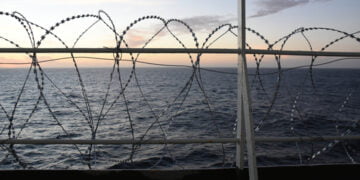The Sea Cargo Charter (SCC) provides a framework that enables shipowners, charterers and cargo owners in the bulk industry to align their activities and promote shipping’s green transition, explains Mr. Mark Smith, Loss Prevention Executive at The North Club.
Many shipowners are beginning to focus their efforts on decarbonising their fleet as we move towards 2030 and 2050 in line with IMO policies and ambitions. But with the introduction of the Sea Cargo Charter, cargo interests and charterers can play an important role too. The Sea Cargo Charter (SCC) provides a framework that enables shipowners, charterers and cargo owners in the bulk industry to align their activities and promote shipping’s green transition. Signatories to the SCC commit to four principles as follows.
1. Assessing climate alignment
Signatories are required to calculate on an annual basis the greenhouse gas (GHG) emissions, both in intensity and total. The performance, or ‘climate alignment’ of the voyage (a voyage is defined as from the start of discharge of the previous cargo to the point of discharge of the cargo) is assessed by comparing the calculated carbon intensity with established decarbonisation trajectories. These trajectories are set by the SCC for each ship type and size class and represent how many grams of CO2 can be emitted to move one tonne of goods one nautical mile (gCO2 /tnm). The calculation relies on the Energy Efficiency Operational Indicator (EEOI) as the carbon intensity metric to quantify CO2 emissions relative to the ship’s operational activities. The EEOI may also form part of the vessel’s ship energy efficiency management plan (SEEMP).
2.Accountability
To ensure the information provided is fair and accurate, signatories can only use data types, sources and service providers identified in the SCC Technical Guidance.
3.Enforcement
A suitable enforcement mechanism in the form of a charterparty clause is required. This ensures the sharing of the appropriate data and information between the SCC signatories and their contractual counterparties. The clause needs to be proposed and included as part of the charterparty agreement negotiated with the contractual counterparty. The SCC clause (and supporting definitions) is designed to be generic and broad in its nature so it can be used with any charterparty form. It is also non-prescriptive to resist any urges to make amendments.
4.Transparency
Firstly, each signatory must publicly announce its entry into the SCC. Then, every year, they must submit their climate alignment scores and the total annual activity alignment score of its chartering activities (with supporting information) for each vessel category to the SCC. The SCC will then publish a report in the public domain containing all vessel category climate alignment scores and total annual activity climate alignment scores.
Industry bodies cautious
BIMCO and the International Chamber of Shipping (ICS) cautiously welcomed the introduction of the SCC, but both publicly expressed their reservations. Guy Platten, secretary general of the ICS has expressed concerns on the SCC, believing it would have a better chance of success if it was to be aligned with the reporting requirements set out by the governments of IMO Member States or even the Poseidon Principles.
This was rejected by members of the SCC who suggest the contrary. Bimco suggested that the SCC is based on old data which may distort reduction targets. However, the list of signatories to the SCC includes some very big and influential names in the shipping and chartering industries. Shipowners wishing to do business with these parties will need to be aware of the SCC and the relevant charterparty clauses as well as understand the reporting requirements.
By Mark Smith, Loss Prevention Executive at North of England P&I Club
Above article was initially published in North Club’s edition ‘ Signals Issue 122” and is reproduced here with authors kind permission.
The views expressed in this article are solely those of the author and do not necessarily represent those of SAFETY4SEA and are for information sharing and discussion purposes only.































































